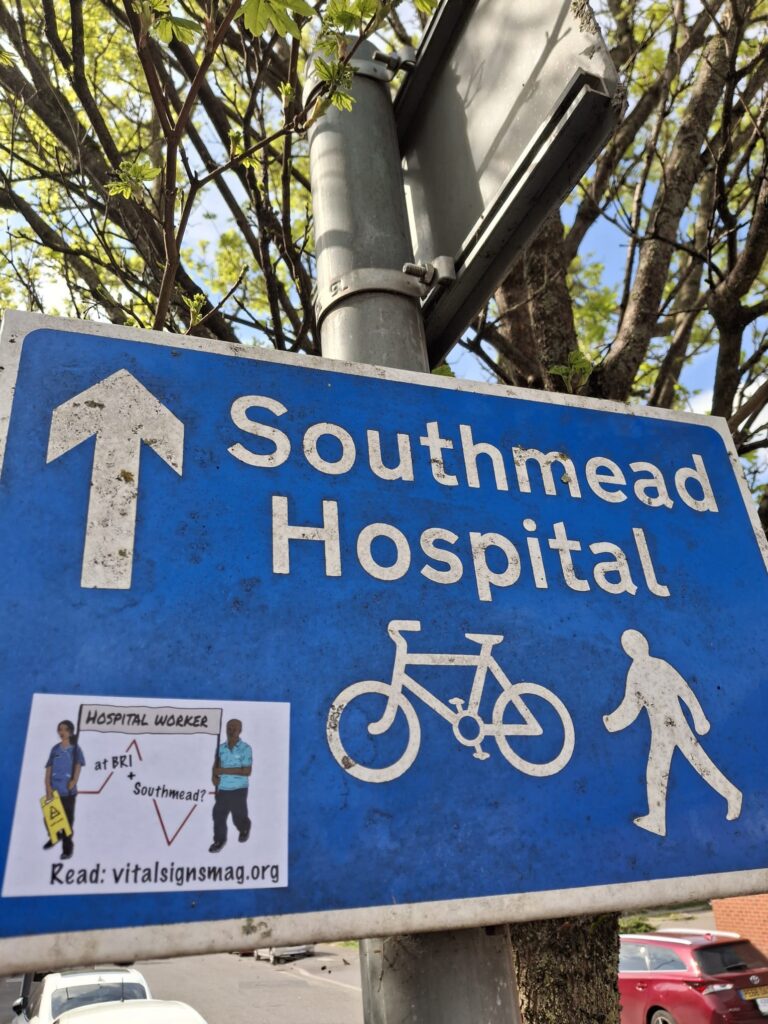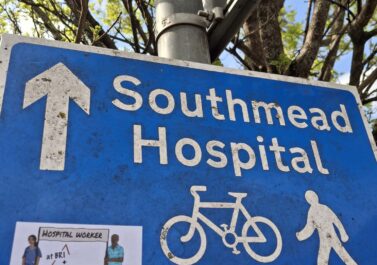
While waiting for further announcements from Zarah and Jeremy…
We are about to distribute a new issue of Vital Signs Magazine amongst our 18,000 fellow hospital workers here in Bristol. Vital Signs is independent and we could do with donations to cover our print-costs.
What is Vital Signs?
Vital Signs is the publication of a small circle of communists who organise meetings and actions with fellow health workers, e.g. against the exclusion of precarious bank workers from the NHS pay increase or against outsourcing of hospital theatres to private companies or against the military attack on health workers in other parts of the globe.
Vital Signs is an experiment of new independent working class politics. We are not aware of many other explicitly revolutionary workplace publications in the UK and hope to contribute to the debate through practical experience. Through a process of sustained activity and publication, our aim is to create a basis upon which a new independent communist organisation can be built. We see this organisation as being grounded in the creation of workers’ political committees in mass workplaces and neighbourhoods. We don’t only see this as a point of principle, but as a practical necessity in conducting effective working class struggles.
What are strategic class locations?
As revolutionaries we are a minoritarian segment of the working class and we have to decide strategically where to base our political activity. The decision of where we focus our activity should not be led by an insular organisational interest, e.g. how can we recruit as many new members to our particular organisation. Instead, it should be led by the question of where struggles of our class can be powerful, break down social divisions within the class and develop a new political horizon.
The UK left is largely concentrated in a few areas: education, hospitality, the voluntary or NGO sector. This means that we are out of touch with many strategic locations. For example with new industries and the engineering sector, where the contradictions between the potential of new technologies and their capitalist application become the most apparent; traditional industries like truck driving or construction, where the combination of internationalisation and self-employment has contributed to the fact that the far-right has gained more of a foot-hold; the essential mass industries that are necessary to take-over in order to produce new social and natural relations, e.g. energy, transport, health, agriculture and manufacturing
A revolutionary organisation has to be able to connect the various elements that different segments of our class bring to the table of social rupture: the socially detached technical knowledge, the experience of industrial collectivity, the experiments of different ways of working and living, the mass anger and proletarian violence. For that we need strategies based on intricate class analysis.
What is revolutionary politics within the workplace?
In general, leftist workplace politics often reproduces the bourgeois separation between economic and political struggle. We see traditional workplace bulletins that primarily focus on rank-and-file ‘trade union’ issues and add leftist positions as external politics.
With Vital Signs we are attempting to do something different. We try to uncover, with our fellow workers, how ‘political decisions’ of the state impact on our working lives and how the structure of the health sector itself is political. We try to criticise the capitalist nature of how our work within the NHS is structured, from the stifling division between intellectual / scientific and manual labour to the hurdles that both bureaucratic and market relations create for our daily cooperation at work. We want to understand the intricate and global structures of the health sector in order to envision how it can be run by workers themselves, in the interest of all.
Here we see a direct relation between the experience of self-organisation in the daily struggle to defend our wages and conditions, to an expansion of worker control and social responsibility as workers, to the development of a plan to take-over our industries and defend them against our class enemy.
For example, for this issue of Vital Signs we interviewed pharmaceutical workers in order to share insights about the contradictions of this segment of the health sector. We spoke to admin workers and occupational therapists, whose labour is often hidden from the rest of the hospital work-force. We wrote on our responsibility as surgical theatre workers to find out where tissue or bone donations originate from. We also included an article that denounces the current migration politics of the state as a divisive attack against the lowest paid workers. We analyse the strengths and weaknesses of recent health workers strikes, and we include information about recent international workers’ actions against war and militarisation.
From collective to party
Rather than waiting for the next hype, for the next ‘mass vehicle’, we have to start small steps of communist politics within our class and reflect on them openly and self-critically for others. From these real experiences we can coordinate practical actions and centralise our strategies in new forms of political organisation.
We cannot dilute a proletarian perspective, which assumes the need for an insurrectionary take-over of the means of production and the defeat of the state forces, by getting lost in electoral politics. We have to prepare ourselves and our fellow workers for the task of transforming the current system of production and distribution. Electoral politics is incapable of preparing us for this, on the contrary, they contribute to the individualisation of our class of collective producers by addressing them as citizens. Voting and the hope that the right people on top will fix things for us turn us into passive spectators.
If the DSA or Die Linke are anything to go by then hundreds, perhaps thousands of comrades of the radical left in the UK are likely to spend most of their political energy on fighting over internal platforms and factions within Your Party, believing that they are engaging in working class politics. It is a political black hole that is structurally limited by UK parliamentarism and its legal system.
This doesn’t mean that the emergence of Your Party is irrelevant. We have to find each other in these tense times. Let’s make sure that the current hope for ‘mass politics’ does not end up in the usual leftist approach of preaching to the masses, but in new working class initiatives. We are eager to hear your comments on our efforts. We want to collaborate with any comrades who are looking for new forms of class politics in mass workplaces and industries.



